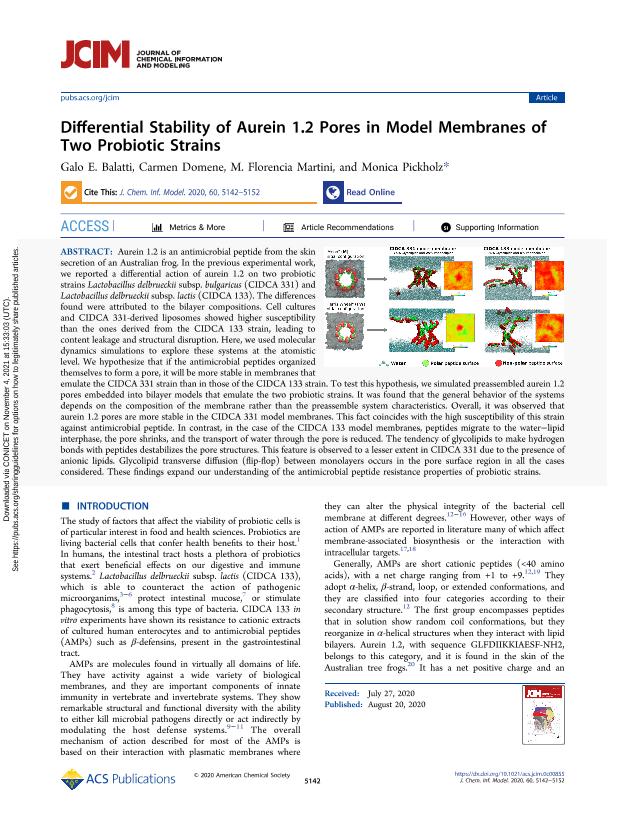Mostrar el registro sencillo del ítem
dc.contributor.author
Balatti, Galo Ezequiel

dc.contributor.author
Domene, Carmen
dc.contributor.author
Martini, María Florencia

dc.contributor.author
Pickholz, Mónica Andrea

dc.date.available
2021-11-04T15:33:52Z
dc.date.issued
2020-08
dc.identifier.citation
Balatti, Galo Ezequiel; Domene, Carmen; Martini, María Florencia; Pickholz, Mónica Andrea; Differential stability of aurein 1.2 pores in model membranes of two probiotic strains; American Chemical Society; Journal of Chemical Information and Modeling; 60; 10; 8-2020; 5142-5152
dc.identifier.issn
1549-9596
dc.identifier.uri
http://hdl.handle.net/11336/146006
dc.description.abstract
Aurein 1.2 is an antimicrobial peptide from the skin secretion of an Australian frog. In the previous experimental work, we reported a differential action of aurein 1.2 on two probiotic strains Lactobacillus delbrueckii subsp. bulgaricus (CIDCA 331) and Lactobacillus delbrueckii subsp. lactis (CIDCA 133). The differences found were attributed to the bilayer compositions. Cell cultures and CIDCA 331-derived liposomes showed higher susceptibility than the ones derived from the CIDCA 133 strain, leading to content leakage and structural disruption. Here, we used molecular dynamics simulations to explore these systems at the atomistic level. We hypothesize that if the antimicrobial peptides organized themselves to form a pore, it will be more stable in membranes that emulate the CIDCA 331 strain than in those of the CIDCA 133 strain. To test this hypothesis, we simulated preassembled aurein 1.2 pores embedded into bilayer models that emulate the two probiotic strains. It was found that the general behavior of the systems depends on the composition of the membrane rather than the preassemble system characteristics. Overall, it was observed that aurein 1.2 pores are more stable in the CIDCA 331 model membranes. This fact coincides with the high susceptibility of this strain against antimicrobial peptide. In contrast, in the case of the CIDCA 133 model membranes, peptides migrate to the water-lipid interphase, the pore shrinks, and the transport of water through the pore is reduced. The tendency of glycolipids to make hydrogen bonds with peptides destabilizes the pore structures. This feature is observed to a lesser extent in CIDCA 331 due to the presence of anionic lipids. Glycolipid transverse diffusion (flip-flop) between monolayers occurs in the pore surface region in all the cases considered. These findings expand our understanding of the antimicrobial peptide resistance properties of probiotic strains.
dc.format
application/pdf
dc.language.iso
eng
dc.publisher
American Chemical Society

dc.rights
info:eu-repo/semantics/openAccess
dc.rights.uri
https://creativecommons.org/licenses/by-nc-sa/2.5/ar/
dc.subject
MOLECULAR DYNAMICS
dc.subject
AUREIN
dc.subject
CIDCA331
dc.subject
probiotics
dc.subject.classification
Biofísica

dc.subject.classification
Ciencias Biológicas

dc.subject.classification
CIENCIAS NATURALES Y EXACTAS

dc.title
Differential stability of aurein 1.2 pores in model membranes of two probiotic strains
dc.type
info:eu-repo/semantics/article
dc.type
info:ar-repo/semantics/artículo
dc.type
info:eu-repo/semantics/publishedVersion
dc.date.updated
2021-09-07T18:24:31Z
dc.journal.volume
60
dc.journal.number
10
dc.journal.pagination
5142-5152
dc.journal.pais
Estados Unidos

dc.journal.ciudad
Washington
dc.description.fil
Fil: Balatti, Galo Ezequiel. Consejo Nacional de Investigaciones Científicas y Técnicas. Oficina de Coordinación Administrativa Ciudad Universitaria. Instituto de Física de Buenos Aires. Universidad de Buenos Aires. Facultad de Ciencias Exactas y Naturales. Instituto de Física de Buenos Aires; Argentina
dc.description.fil
Fil: Domene, Carmen. University of Bath; Reino Unido
dc.description.fil
Fil: Martini, María Florencia. Consejo Nacional de Investigaciones Científicas y Técnicas. Oficina de Coordinación Administrativa Houssay. Instituto de Química y Metabolismo del Fármaco. Universidad de Buenos Aires. Facultad de Farmacia y Bioquímica. Instituto de Química y Metabolismo del Fármaco; Argentina
dc.description.fil
Fil: Pickholz, Mónica Andrea. Consejo Nacional de Investigaciones Científicas y Técnicas. Oficina de Coordinación Administrativa Ciudad Universitaria. Instituto de Física de Buenos Aires. Universidad de Buenos Aires. Facultad de Ciencias Exactas y Naturales. Instituto de Física de Buenos Aires; Argentina
dc.journal.title
Journal of Chemical Information and Modeling

dc.relation.alternativeid
info:eu-repo/semantics/altIdentifier/url/https://pubs.acs.org/doi/10.1021/acs.jcim.0c00855
dc.relation.alternativeid
info:eu-repo/semantics/altIdentifier/doi/http://dx.doi.org/10.1021/acs.jcim.0c00855
Archivos asociados
